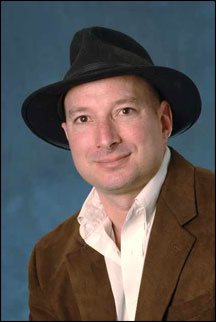Physics professor set to testify before Congress on value of STEM
CU-Boulder's Finkelstein to stress need for education funding
 |
| Noah Finkelstein |
Noah Finkelstein, an associate professor of physics education research at the University of Colorado at Boulder, will testify before Congress about STEM (science, technology, engineering and math) education at the undergraduate and graduate levels.
Finkelstein, a co-principal investigator in the university's Integrating STEM Education (iSTEM) program, will speak on Thursday, Feb. 4, before the U.S. Congressional House Research and Science Education Subcommittee, House Committee on Science and Technology.
Finkelstein will discuss the roles universities can and need to play in the broader challenges of STEM education, including quality, access and inclusion, preparation of teachers at all levels, and numbers of STEM majors. He will testify about leading research, reforms and models for improving STEM education.
Said Finkelstein, "Successful research-based programs at the University of Colorado at Boulder, such as the Colorado Learning Assistant model, demonstrate that we can increase student learning and engagement, include more students, engage faculty, recruit more and better STEM teachers, and do so in a sustainable, scalable and cost-effective manner."
In his testimony, aimed at encouraging federal funding, Finkelstein plans to make three main points:
- Research has demonstrated that traditional models of classroom-based education are no longer appropriate. New models that engage students in learning experiences are critical.
- So far, higher education has been separated from national discussions on educational reform. It's time to focus on integrated approaches that reach across disciplines and across levels of the educational system to provide solutions that address our broad national challenge.
- We need the investment of the American citizenry and the university system. We need to engage STEM faculty and researchers in educational innovation and change.
Congress is preparing to reauthorize the America COMPETES Act, which focuses on increasing research investment; strengthening educational opportunities in science, technology, engineering and mathematics from elementary through graduate school; and developing an innovation infrastructure.
"Math and science are the engine of the U.S. economy," Finkelstein said, but "we are under-educating the population at all levels."
The subcommittee hearing begins at 8:30 a.m. MDT and will be webcast live. To listen to testimony, visit http://science.house.gov/publications/hearings_markups_details.aspx?newsid=2723 and click on "Webcast Info" on the right-hand side of the page. The testimony, both oral and written, will be available on the Web site within a day of the hearings.
CU-Boulder Chancellor Philip P. DiStefano visited the White House on Jan. 6 as one of four public research university leaders representing about 120 universities pledging to address the national shortage of science and mathematics teachers.

|